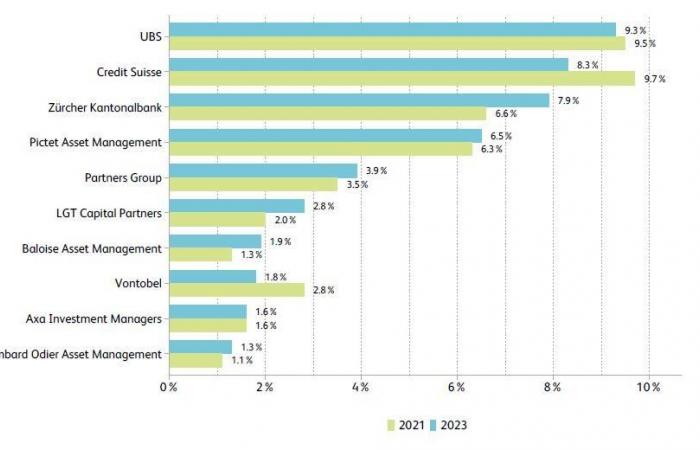“The Asset Management Study 2024 confirms that the sector is not only an essential pillar of the Swiss economy, but will become even more important in the years to come,” explains Adrian Schatzmann.
The Swiss asset management sector is once again on the path to robust growth and is proving to be an important pillar of the Swiss economy. This is shown by the results of the Swiss Asset Management Study 2024 published on Tuesday by the Asset Management Association Switzerland (AMAS) and the University of Lucerne (HSLU). Even after the takeover of Credit Suisse by UBS, the Swiss asset management sector stands out for its strong international competitiveness and a widely diversified range of products and services. The Swiss pension system also benefits from this.
After a year 2022 full of challenges, the Swiss asset management sector has returned to robust growth. Assets under management (AuM) in Switzerland increased by 8.3% in 2023 to CHF 3,177 billion, currently making Switzerland the third largest asset market in Europe. The growth of the sector proves that asset management as a whole constitutes an important pillar of the Swiss economy and that it proves profitable for the most diverse interest groups.
In 2023, the asset management sector will contribute around one percent of Switzerland’s GDP. It generated CHF 4.05 billion in profits, paid CHF 0.59 billion in taxes and provides around 58,700 full-time jobs. Pension funds represent a significant part of the client base of the asset management sector: In 2023, this translated into capital market contributions generated in the 2nd pillar to the tune of CHF 59 billion, which underlines the elementary role of asset management in the Swiss pension system.
Adrian Schatzmann, CEO of the Asset Management Association Switzerland (AMAS), comments: “The Asset Management Study 2024 confirms that the sector is not only an essential pillar of the Swiss economy, but will become even more important in the years to come. The sector’s evolution is characterized by substantial growth, increased social relevance, a stronger commitment to sustainable development, a shift towards private and less liquid markets, increased regulatory oversight and transformative technological advances.
Regarding the other results of the study, Jürg Fausch, economist at the University of Lucerne and co-author of the study, adds: “In 2023, around 30% of assets under management (AuM) were managed for institutional clients foreigners. Over the seven-year period from 2017 to 2023, the share of exports increased by 4.8 percentage points. This high percentage of exports illustrates the international demand for Swiss wealth management and underlines the importance of national expertise.
The takeover of Credit Suisse by UBS marked an important turning point for the Swiss asset management industry in 2023 and changed the structure of the market. In 2023, UBS was the largest Swiss asset manager with a market share of 9.3%, compared to 8.3% for Credit Suisse.
Thanks to this acquisition, UBS will potentially hold a market share of 18%, but the competitive landscape, strongly determined by the presence of foreign asset managers and large cantonal banks, prevents it from occupying a dominant position in the market. The share of alternative investments in the asset mix of Swiss asset managers has continued to grow, now reaching 24%, further strengthening Switzerland’s position in this high-margin activity. While passive investments continued to grow, active management remained predominant among Swiss asset managers.
Despite the strong growth recorded in 2023, the Swiss asset management sector faces a number of challenges. First, assets under management have certainly increased in 2023, but the profitability of the sector has experienced a negative development. Second, public pressure is increasing on asset managers to make a measurable contribution to climate protection and greater sustainability. Sustainable finance initiatives such as self-regulation, Swiss Climate Scores and the Swiss Stewardship Code, actively promoted by the Asset Management Association Switzerland (AMAS), are gaining importance among Swiss asset managers and are expected to contribute significantly to the achievement of sustainability objectives.







